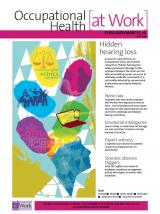February/March 2016 (vol. 12/5)
ContentsFeaturesNewsLegal
NewsResearch DigestResearch PlusCPD
Research Plus
Presenteeism linked to weight gain
Analysis of data from a Danish study of healthcare workers found significant relationships between lower sickness presenteeism with lower body weight and with higher muscle strength. In total, 139 female healthcare workers took part in the ‘FINALE-health’ study – a 12-month cluster-randomised controlled trial of an intervention comprising dietary advice, strength exercises, cognitive behavioural training and leisure time physical activity. Results from the study are published elsewhere; the analysis reported here is based on anthropometric, physical capacity and self-reported productivity data collected during the trial. On-the-job performance – the inverse of presenteeism – was assessed using one question from the World Health Organization Health and Work Performance Questionnaire (self-rated productivity in the last month), one from the Work Ability Index (current work ability compared with lifetime best) and two on work quality and quantity (impact of health problems in the last month on quantity and quality of work). In the crosssectional analysis, higher on-the-job performance (ie lower presenteeism) was significantly associated with lower BMI (p = 0.024) and with greater maximal voluntary contraction (MVC) – a measure of muscle strength (p = 0.024). Those with a BMI of over 30 kg/m2 had lower on-the-job performance than those with a BMI of less than 25 kg/m2 (p = 0.043). Higher on-the-job performance (lower presenteeism) was also associated with decreasing BMI (p = 0.004) and increasing MVC (p = 0.046) over three months. The influences of depression and job satisfaction were not assessed.
Occupational Health at Work February/March 2016 (vol. 12/5) pp36



